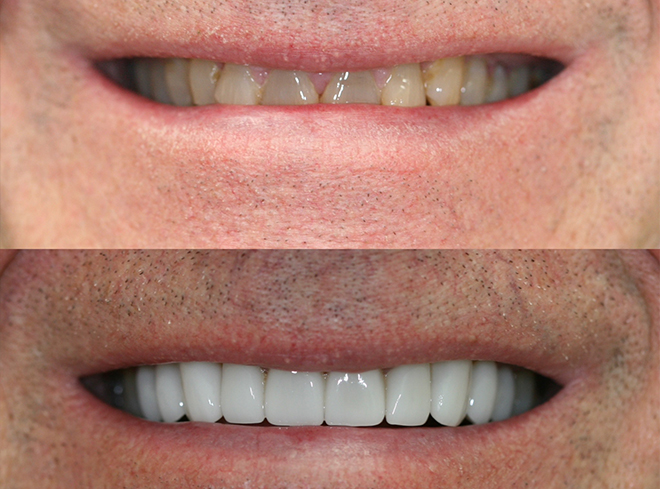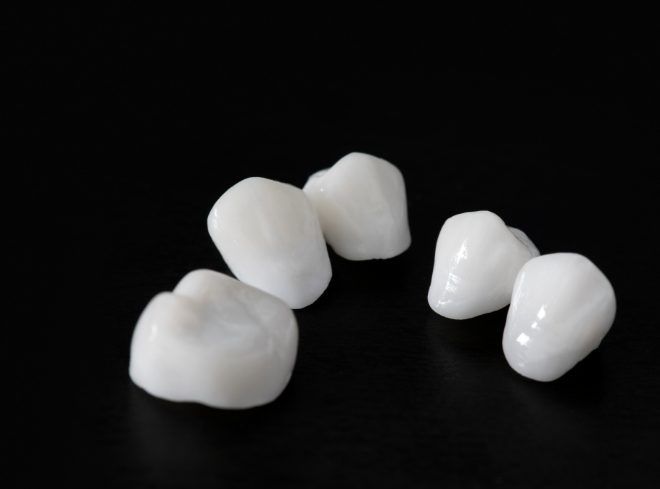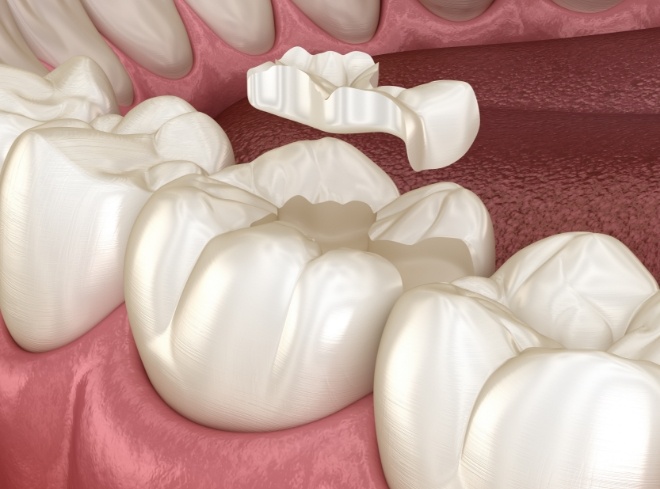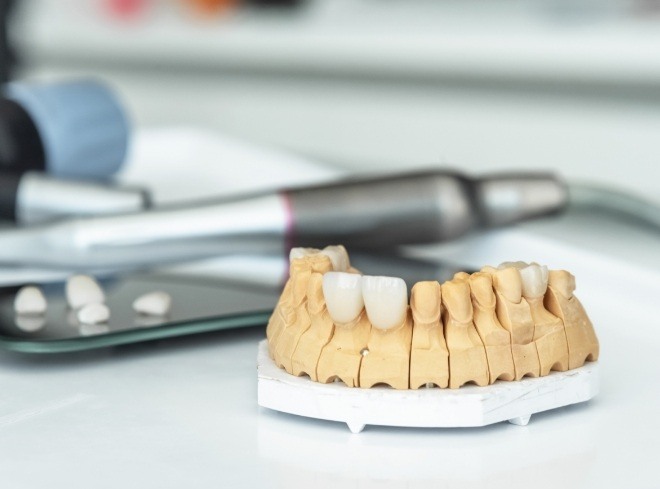Dental Crowns – Houston, TX
Beautiful, Strong, & Made to Last

When you develop a cavity, Dr. Alani will remove the decay and place a filling that matches your tooth's color. If your tooth has extensive decay or a fracture, we may recommend placing an all-porcelain dental crown in Houston. Designed to restore strength, function, and appearance, a porcelain dental crown fits snugly over the remaining, healthy tooth structure.
Why Choose Terri Alani, DDS for Dental Crowns?
- High-Tech Scanner Which Takes the Place of Taking Impressions
- All Crowns Are Porcelain and Metal-Free
- Uses a Boutique Cosmetic Local Dental Lab
Advantages of All-Porcelain Dental Crowns

- Porcelain crowns not only reflect light, but they mimic the transparency found in natural teeth.
- Because we can place the tooth-shaded margin at or above the gumline, we reduce the risk of gum irritation and prevent gum recession.
- You won't notice a dark line at the gums as you would with a porcelain-fused-to-metal crown(PFM).
- Porcelain (ceramic) is an extremely biocompatible material with no allergic potential.
Unbreakable Zirconia Crowns

As part of our dedication to giving our Houston-area patients the best dental care possible, we offer what we call “unbreakable crowns.” We call them that because they’re quite simply the strongest crowns available. Made from the same kind of high-strength ceramic material that the aerospace industry uses, they’re excellent for restoring back teeth.
Another reason for the effectiveness of unbreakable dental crowns, which are made from Zirconia, is that they have a very precise fit. As a result, where normal ceramic restorations are typically weak, unbreakable crowns are much sturdier. The result is a long-lasting ceramic restoration that looks natural, is incredibly functional, and eliminates the risk of allergic reactions.
If you have a tooth in need of restorative help, let Dr. Alani’s Houston dental office be your source of unbreakable crowns.
Dental Onlays

Onlays, often called partial crowns, offer a conservative alternative to a full crown in some situations. Unlike traditional porcelain crowns, onlays end halfway up the tooth, which prevents plaque formation at the margin of the tooth and gum. Dr. Alani will evaluate your case to determine whether a full ceramic crown or onlay will offer the best restoration for your smile.
E.Max Dental Crowns and Onlays

For more durable and aesthetically pleasing results, Dr. Alani offers e.max dental crowns and onlays. E.max restorations are known for their attractive appearance and their strength. With your e.max restoration in place, you can look forward to longer-lasting results that blend in with your natural teeth by mimicking the translucent color of natural enamel.
Dental Crown FAQs
Does It Hurt to Get a Dental Crown?
Dental crowns are used to repair and protect severely damaged teeth. As such, you may be in a good deal of pain when you receive one, however the procedure itself is relatively painless. Dr. Alani will ensure that your mouth is numbed with an anesthetic before the treatment begins so you should only feel some mild pressure or discomfort. The pain that comes from tooth decay or trauma is far greater than any discomfort you’ll feel from getting a dental crown. However, if you do experience pain, be sure to speak up and let Dr. Alani know so she can help you remain comfortable.
What Are Dental Crowns Made Of?
Different dentists across the country use different materials for crowns such as silver, gold, and resin. However, there are some popular choices that have begun to emerge as the best-in-class. At Terri Alani, DDS, we use all-porcelain and zirconia restorations to reshape your smile. These mediums have proven to be the strongest, longest-lasting, and most aesthetically pleasing options. This is because we found that patients really didn’t care to have metal glinting off their teeth in pictures or while socializing with friends. Porcelain and zirconia both look just like natural teeth and offer excellent protection against further damage.
Are Dental Crowns Permanent?
Unfortunately, the underlying tooth that is reshaped for the procedure will always be reduced and need a dental crown to protect it. However, our crowns tend to last for five to 15 years depending on factors like your diet, oral hygiene habits, and necessary precautions. Be sure to continue brushing your teeth twice a day, flossing each night, and eating a balanced diet of wholesome foods to keep your restoration looking and feeling great. If you do sports or other activities, try to wear proper mouth protection to keep your new restoration from being damaged.
Do Dental Crowns Get Cavities?
Since our dental crowns are made with high-grade ceramics, they can’t be affected by bacteria that cause tooth decay. However, this doesn’t mean you can neglect your oral care! While the restoration can’t get cavities, the underlying tooth can, and the bacteria can also cause gum disease. Both oral issues may weaken or dislodge your crown over time, so it’s best to avoid them by taking care of your teeth at home and scheduling regular dental appointments.
